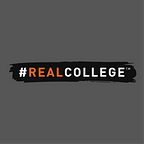Stop Talking About Financial Literacy and Start Talking About Wealth Justice
Higher education loves its fads — and one of the hottest fads of the moment is “financial literacy.”
Financial literacy is the ability to understand how money works in the world: how someone manages to earn or make it, how that person manages it, how he/she invests it (turn it into more) and how that person donates it to help others.
See that student short of money for college? He needs financial education to learn how to fill out FAFSA (Free Application for Federal Student Aid).
See that student asking her financial aid officer for more support, since the end of the money came before the end of the month? She needs financial education to learn how to budget.
See that homeless student sleeping in his car outside of his biology class? He needs financial education to accept “personal responsibility” and to learn how to get and keep a job.
Pointing to students’ lack of financial literacy as the primary cause of their financial challenges is about as popular right now as pointing to their lack of grit. There are dozens of products marketed (with big price tags but sans positive impacts) to colleges and universities across the country that are concerned students find them unaffordable, are borrowing “too much” money (or not enough), or are choosing majors that won’t lead to payoffs commensurate with their expected debt levels.
This focus on financial literacy is misplaced and doing tremendous harm. At best, it distracts from the real problems in higher education, which include prices so high and a college financing system so complicated that you practically need graduate work to effectively pay for college. At worst, it disappears in the broader political economy of college financing, placing blame on individuals and serving to perpetuate the structures that harm them. This is financial shaming, and it is White supremacist and oppressive.
Economists Darrick Hamilton and William Darity, Jr., offer a beautiful illustration of this challenge in a paper on education, financial literacy, and the racial wealth gap. Much like explanations for racial and class disparities in higher education, popular explanations for racial disparities in wealth focus on poor financial choices and decision-making by people of color. But as the authors point out, the “framing is wrong — the directional emphasis is wrong. It is more likely that meager economic circumstance — not poor decision-making or deficient knowledge — constrains choice itself.”
They go on to write, “Financial behavior and financial literacy are practically limited for households and race groups with little to no finances to manage.” It’s not that students of color — or students from low-income families — don’t understand the importance of saving. It’s that they don’t have money to save!
This fact cannot come as a surprise. The question is who benefits from ignoring it, and instead investing in financial education rather than lowering the price of college? Answer: the political and economic elite, who — as Hamilton and Darrity explain — employ a “neoliberal perspective, where the free market, as long as individual agents are properly incentivized, is supposed to be the solution to all our problems, economic or otherwise.”
That perspective is getting us nowhere when it comes to improving educational opportunities in this country. There are real reasons why so many students do not have enough money for college. Let’s focus our attention where it matters most and not (intentionally or otherwise) distract from serious structural challenges by pretending like these are personal problems of individuals effectively addressed by financial education. If we are serious about advancing equity and particularly racial equity, we must talk about wealth justice.
Chloe McKenzie, a research fellow at The Hope Center, is a trailblazer who is rightly shifting the discussion to financial trauma. She is doing that work by calling out the White supremacy embedded in financial literacy. In her most recent paper, she explains:
Too often financial literacy (and our economic system more broadly) promotes forgetting social and historical context. This is why learners begin to conflate their inherent worth with their net worth.
Financial literacy deceivingly emphasizes that wealth-building capability is most influenced by individual behavior, not the impact oppressive systems have on our relationships with money, value, wealth, and worth.
Financial literacy too often normalizes economic violence.
She’s absolutely right. We cannot judge or attempt to cope with how students struggle to make ends meet in college without first recognizing the financial trauma, shaming, and outright abuse many have endured throughout their lives and in the lives of their families. Developing a trauma-informed approach to supporting #RealCollege students is necessary and long overdue. It must be integrated into how we build out basic needs ecosystems and how we approach policy change.
Wealth justice — not financial literacy — is a North Star in work ahead for The Hope Center and the #RealCollege Movement. I hope you’ll join us in that effort.
This piece was originally in our President & Founder Sara Goldrick-Rab’s Medium blog.
Sara Goldrick-Rab is a professor of sociology & medicine at Temple University, and president & founder of The Hope Center for College, Community, and Justice in Philadelphia. She is the chief strategy officer for emergency aid at Edquity, a student financial success and emergency aid company, and she founded Believe in Students, a nonprofit distributing emergency aid.
Interested in sharing your #RealCollege story? Submit here.
